|
|
|
AP
BIOLOGY FAQ's
|
|
 WHAT IS AP BIOLOGY? WHAT IS AP BIOLOGY?
 Why should I take
AP BIOLOGY? Why should I take
AP BIOLOGY?
 What
are the prerequisites for AP BIOLOGY? What
are the prerequisites for AP BIOLOGY?
 What topics are covered in AP BIOLOGY? What topics are covered in AP BIOLOGY?
 Will
we do labs? Will
we do labs?
 What are the major themes of AP
BIOLOGY? What are the major themes of AP
BIOLOGY?
 2020 Course
description-College Board
2020 Course
description-College Board
 How
much homework can I expect? How
much homework can I expect?
 What
if I am taking multiple AP classes? What
if I am taking multiple AP classes?
 WHAT
is the AP EXAM like? WHAT
is the AP EXAM like?
 When
is the AP Bio Exam? When
is the AP Bio Exam?
 2020 AP TEST SCHEDULE 2020 AP TEST SCHEDULE
 Will
the college I attend accept my AP credit? Will
the college I attend accept my AP credit?
 How do most students score on the AP exam? How do most students score on the AP exam?
 How do BHS test scores compare to the How do BHS test scores compare to the
National Average?
|
|
WHAT IS AP BIOLOGY?
The AP
Biology course is
a fast
paced, challenging, and fun year long biology course
designed to be the
equivalent of a two-semester college introductory course usually taken by
biology majors their first year.
Success in this course will depend on
your study skills, reading and writing abilities, motivation and maturity. AP
BIOLOGY differs significantly from the usual first high school course in biology
with respect to the kind of textbook used, range and depth of topics covered,
laboratory work done by students, and time and effort required of the students.
The textbook used for AP Biology is one used by many college biology majors. The
labs done by AP students must be the equivalent of those done by college
students.
The course
will culminate in the taking of the Advanced Placement Biology Examination.
After showing themselves to be qualified on the AP Examination, some students,
as college freshmen, are permitted to undertake upper-level courses in biology
or to register for courses for which biology is a prerequisite. Other students
may have fulfilled a basic requirement for a laboratory-science course and will
be able to undertake other courses to pursue their majors. Many colleges give
credit for introductory biology to applicants with a score of 3 if they are
non-science majors, but few will accept a score of 3 for credit or advanced
placement if the student is a science major.

WHY
TAKE AP BIOLOGY? The
Value of Taking AP Biology
-
For personal satisfaction
-
Because you love biology
-
To compare yourself with
other students across the nation
-
Because colleges look
favorably on the applications of students who elect to enroll in AP
courses
(Did you know students who enroll in AP courses are more likely to
complete college in 4 years, chose challenging majors, and complete
college with a better grade point average than students who
don't take AP courses in High School)
-
To receive college credit
or advanced standing at your college/university
-
So you can save some $ by
not having to pay for the tuition/fees/book expenses if you took
this class in college

WHEN is the AP Bio Exam?
Countdown
to exam
WHAT
is the AP EXAM like?
The
AP Exam will be administered Monday May 11, 2020 It is 3 hours long and
consists of 100 multiple choice questions (60%) and 4 essay style questions
(40%).
See College Board for
more information about the AP EXAM
|

How do most students score on the AP exam?
|
AP BIOLOGY TEST SCORE
AVERAGES
|
|
Overall United States Averages
(1994-2006)
|
United States
Average
2007
|
United States Average
2008
|
BHS Test Scores
2008 |
|
|
|
19.3
|
18.3 %
|
25 %
|
|
|
|
20.3
|
15.7 %
|
25 %
|
|
|
|
21.2
|
16.1 %
|
25 %
|
|
|
|
23.2
|
15.3%
|
25 %
|
|
|
|
15.9
|
34.6 %
|
0 %
|
|

Is the AP Biology test "curved"?
2008 AP BIOLOGY Scoring breakdown
The total score was out of 150 points
5 = 95 - 150
4 = 77 - 94
3 = 59 - 76
2 = 37 - 58
1 = 0 - 36

What
if I am taking multiple AP classes?
Students taking multiple AP
classes should be aware of the coursework expectations.
Budgeting your time to complete homework, learn content, and prepare for AP
Exams is essential to success.
AP EXAM SCHEDULE FOR 2008
|
May 5
AP Gov't &
Politics
|
May 6
|
May 7
AP Calculus
|
May 8
AP English
Literature
|
May 9
AP
US History
|
|
May 12
|
May 13
|
May 14
AP English
Language
|
May 15
AP World History
|
May 16
AP Human Geography
|

How
much homework can I expect?
Students
should expect to complete a MINIMUM of 5-10 hours of study OUTSIDE of class each
week. Students
taking multiple AP courses should be aware of the time commitment required by
each.
Keeping
up with the READING
is Very Important! Read your textbook nightly. Stay up-to-date; Be prepared for a
pop-quiz over reading assignments at any time. Homework is assigned nightly. This is not a class where cramming the day before a test will work!

What
are the prerequisites for AP BIOLOGY?
The prerequisites for AP BIOLOGY
are:
One year of Biology (Bio I & II)
OR (Cell Bio and Bio II)
AND One year of Chemistry
Students who have requested permission
to be admitted to the class WITHOUT these prerequisites should understand
that they will be responsible for material covered in these classes and
additional independent study and review may be required in these areas.

|
How are the topics broken up on the AP exam?
Molecules & Cells ------------------------------------------------ 25%
Chemistry of Life ------------------------------------------7%
Water
Organic molecules in organisms
Free energy changes
Enzymes
Cells----------------------------------------------------------10%
Prokaryotic and eukaryotic cells
Membranes
Subcellular organization
Cell cycle and its regulation
Cellular Energetics-----------------------------------------8%
Coupled reactions
Fermentation and cellular respiration
Photosynthesis
Heredity and Evolution---------------------------------------------25%
Heredity-------------------------------------------------------8%
Meiosis and gametogenesis
Eukaryotic chromosomes
Inheritance patterns
Molecular Genetics------------------------------------------9%
RNA and DNA structure and function
Gene regulation
Mutation
Viral structure and replication
Nucleic acid technology and applications
Evolutionary Biology---------------------------------------8%
Early evolution of life
Evidence for evolution
Mechanisms of evolution
Organisms and Populations-----------------------------------------50%
Diversity of Organisms------------------------------------8%
Evolutionary patterns
Survey of the diversity of life
Phylogenetic classification
Evolutionary relationships
Structure and Function of Plants and Animals--------32%
Reproduction, growth, and development
Structural, physiological, and behavioral adaptations
Response to the environment
Ecology-------------------------------------------------------10%
Population dynamics
Communities and ecosystems
Global issues
|
What are the major themes in the course?
-
Science as a Process
- Science is a way of knowing. It can involve a discovery process using
inductive reasoning, or it can be a process of hypothesis testing.
-
Evolution
- Evolution is the biological change of organisms that occurs over time and
is driven by the process of natural selection. Evolution accounts for the
diversity of life on Earth.
-
Energy Transfer
- Energy is the capacity to do work. Organisms are active (living) because
of their abilities to link energy reactions to the biochemical reactions
that take place within their cells.
-
Continuity and Change
- All species tend to maintain themselves from generation to generation
using the same genetic code. However, there are genetic mechanisms that
lead to change over time, or evolution.
-
Relationship of Structure to Function
- The structural levels from molecules to organisms ensure successful
functioning in all living organisms and living systems.
-
Regulation
- Everything from cells to organisms to ecosystems is in a state of dynamic
balance that must be controlled by positive or negative feedback mechanisms.
-
Interdependence in Nature
- Living organisms rarely exist alone in nature.
-
Science, Technology, and Society
- Scientific research often leads to technological advances
that can have a positive and/or negative impacts on society as a whole.

Labs:
The College Board has designated
the following twelve laboratory activities as being required for this
course:
Lab 1. Osmosis and Diffusion
Lab 2. Enzyme Catalysis
Lab 3. Mitosis and Meiosis
Lab 4. Plant pigments & Photosynthesis
Lab 5. Cell Respiration
Lab 6. Molecular Biology
Lab 7. Genetics of Organisms
Lab 8. Population Genetics and Evolution
Lab 9. Transpiration
Lab 10. Physiology of Circulatory System
Lab 11. Animal Behavior
Lab 12. Dissolved Oxygen & Aquatic Primary Productivity
AP
Biology is designed to be a lab-based course. In
addition to the 12 recommended
lab activities, we
will complete additional hands
on activities, supplemental
labs, and computer simulations.
Some activities such as labs may run longer than a single class
period and may require additional time outside of class to complete. AP BIOLOGY has been scheduled 4th hour so
that students may extend lab time into lunch period if necessary. Due to the
complexity and perishable nature of certain labs/supplies, it will not be
possible to make up some labs, If you are absent, alternative data may be
supplied for use in completing a lab write up. You will still be
responsible for the concepts.
In order to participate in lab activities, students and parents must sign
a LAB
SAFETY CONTRACT.

Will
the college I attend accept my AP credit?
Depending on your score on the AP
Exam, certain universities may give you credit for for an introductory biology
course. Each university is different and different scores are treated
differently by different schools. Also, some degree programs DO NOT accept AP
Credit for introductory courses. Some
colleges require you to submit your AP Lab manual to receive credit for the lab
portion.
If you are taking AP BIOLOGY in order
to receive college credit, PLEASE CHECK WITH THE INSTITUTION you plan on
attending to see what their policy is regarding AP credit.

Textbooks/Other Resources
you will check out and return:
|
AP BIOLOGY w/ CD-ROM- 7th edition
By Neil A. Campbell and Jane B. Reece
Prentice Hall/Benjamin Cummings; 2005
Students will receive a copy with CD and will
also have access
to their textbook online
at Campbell
& Reece log in
These can be purchased on
Amazon.com for $130.45
|

|
|
Cliff's AP BIOLOGY will
be available for checkout for student use, but these must be returned at
the end of the year UNMARKED.
IF YOU WISH TO WRITE IN YOUR COPY,
PLEASE PURCHASE YOUR OWN ($19.79) at Amazon.com
|
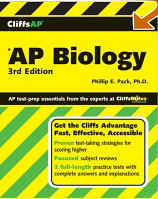
|
|
AP BIOLOGY Test
Prep Series
By Fred Holtzclaw and Theresa Holtzclaw
will be available for check out for student use, but these must be
returned at the end of the year UNMARKED.
|
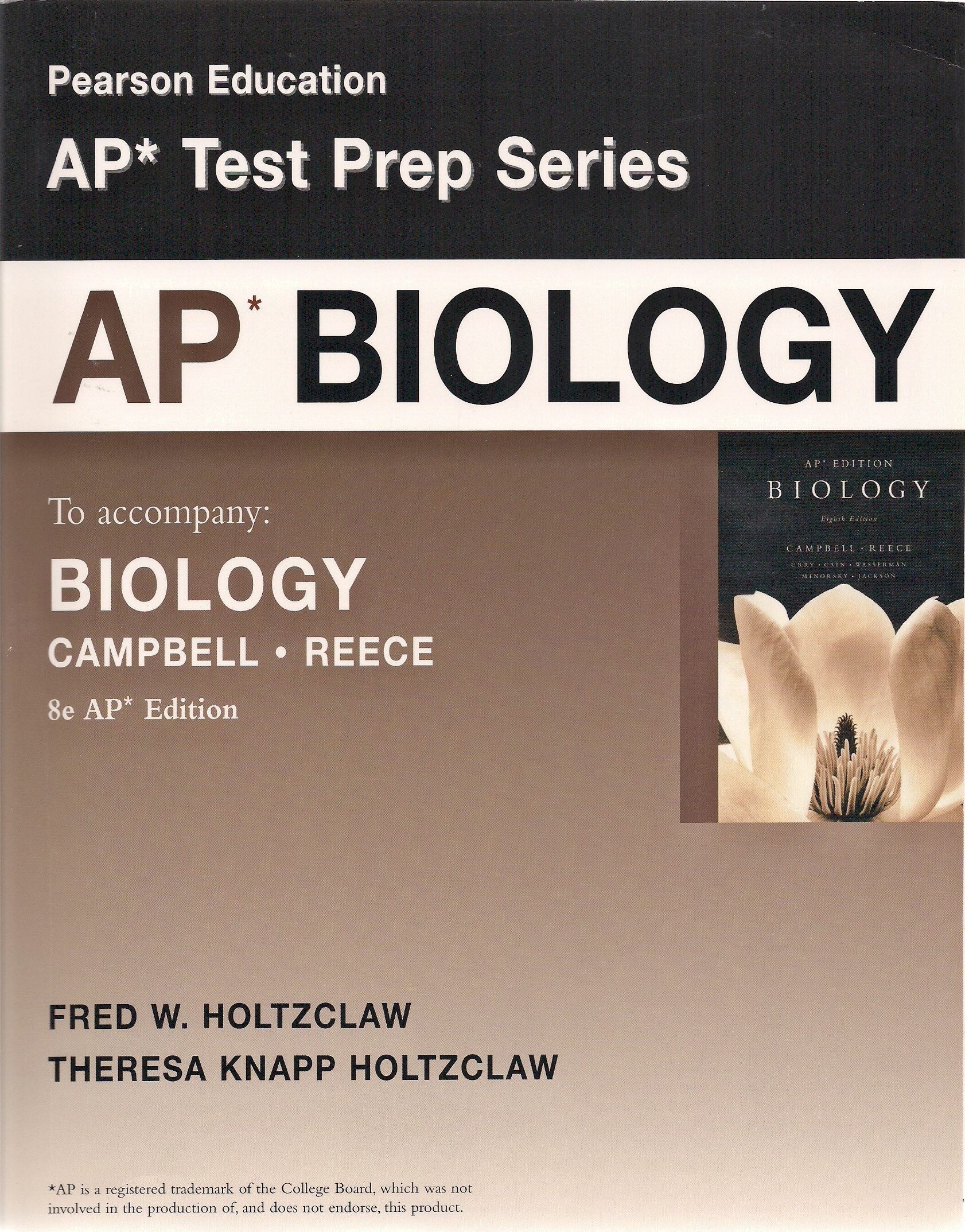
|
Numerous other OPTIONAL
AP resources are available for purchase including: Check
copyright dates to make sure you are getting the most up to date
version.
TOP
5 AP BIO SUPPLEMENTAL RESOURCES
|

Cliffs AP Biology
3rd Edition
(Order this one to write in.)
|
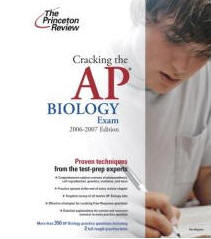
Princeton Review
Cracking the AP Biology Exam 2008 edition
|

McGraw-Hill
5 Steps to a 5
AP Biology |
|

Kaplan AP Biology
2008 edition
|
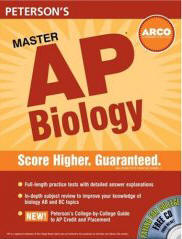
Peterson's Master AP Biology 2008
|
|

Back to top
SUPPLIES
You will need:
1. SEVERAL 3 ring binders
with section DIVIDERS
2. Lined notebook paper
3. blue/black pens (red or other color for correcting)/pencils
4. Pack of sticky notes
4. Markers OR colored
pencils

Back to top
HELP
I am available before/after school and at arranged times to answer student
questions and provide help. You can also come and see me if you have a
study hall during my planning times (See me ahead of
time for a pass) Please arrange a time with me to come if you don't
understand something.
I am also the Lighting/Sound advisor for the school plays so during play season
it is especially important to talk with me ahead of time to arrange help time.
Parent communication
Please let me know anytime you have concerns or questions.
Grades may be checked on the DDN
See my schedule to free times during the day to call.
My office phone: 696-4147 (before & after school)
Home phone: 693-3162 (before 11:00 pm please)
School email: Kelly.Riedell@k12.sd.us
If you want to check on what we're up to you can go to
the website (http://kr021.k12.sd.us)
and choose AP BIOLOGY for information, homework assignments, due dates,
review games for tests, etc.
(Usernames/Passwords were sent home the first day)

Back to top
Late work
Learning to budget your time and meet deadlines is
a valuable job/life skill which students will need in the "real
world". LATE WORK IS NOT ACCEPTABLE. Failing to turn in
assignments is NOT an option. Assignments turned in after the due date will drop
1 letter grade each day.
After papers have been graded and
returned to the class,
the assignment will be worth 0%. Students may complete work for up to 50% points in my
room.
Once a unit is finished and tested
over, homework from that chapter WILL NOT
BE ACCEPTED.
Back to top

Absences/Make Up work:
It is your responsibility to arrange for completing work if you are absent. BHS
handbook policy for absences/make up work will be followed.
If YOU KNOW IN ADVANCE you will be gone you must arrange to complete work
BEFORE the absence.
If you don't know ahead of time you will be gone (illness, etc.) you will have 2
days for each day absent to complete any makeup work.

Back to top
Grading:
All assignments are of
value and will be graded. Overall grades will be based on correctness, completeness of
work, class participation, and effort.
Opportunities for some extra credit will be available.
|
Brookings High School
grading scale:
98-100% = A+
95-97
% = A
92-94
% = A-
89-91 %
= B+
86-88%
= B
83-85%
= B-
80-82% = C+
77-79%
= C
74-76% = C-
71-73% = D+
68-70% = D
65-67% = D-
Below 65% = F
|
Due to the rigor of an AP course, a
"B" in an AP course counts as an "A" for the purposes of GPA
calculations.
|

Back to top
My schedule
|
2009-2010
|
M-T-Th-F
|
1st Semester
|
2nd Semester
|
|
1st Hour
|
8:15-9:04
|
PREP
|
PREP
|
|
2nd Hour
|
9:09-9:58
|
BIOLOGY
I
|
ZOOLOGY
|
|
3rd Hour
|
10:03-10:52
|
BIOLOGY
I
|
ZOOLOGY
|
|
4th Hour
|
10:57-11:46
|
AP
BIOLOGY
|
AP
BIOLOGY
|
|
LUNCH
|
11:46-12:31
|
LUNCH
|
LUNCH
|
|
Reading
|
12:31-12:45
|
DEAR
|
DEAR
|
|
5th Hour
|
12:45-1:34
|
PREP
|
BIOLOGY
II
|
|
6th Hour
|
1:39-2:28
|
BIOLOGY
I
|
PREP
|
|
7th Hour
|
2:33-3:22
|
AP
BIOLOGY
|
AP
BIOLOGY
|
|
|
WED
|
1st Semester
|
2nd Semester
|
|
1st Hour
|
8:15-8:58
|
PREP
|
PREP
|
|
2nd Hour
|
9:03-9:46
|
BIOLOGY
I
|
ZOOLOGY
|
|
3rd Hour
|
9:51-10:34
|
BIOLOGY
I
|
ZOOLOGY
|
|
4th Hour
|
10:39-11:21
|
AP
BIOLOGY
|
AP
BIOLOGY
|
|
LUNCH
|
11:21-12:06
|
LUNCH
|
LUNCH
|
|
5th Hour
|
12:06-12:48
|
PREP
|
BIOLOGY
II
|
|
6th Hour
|
12:53-1:35
|
BIOLOGY
I
|
PREP
|
|
7th Hour
|
1:40-2:22
|
AP
BIOLOGY
|
AP
BIOLOGY
|
2010 AP TEST SCHEDULE
|
MONDAY
5/3
|
TUESDAY
5/4
|
WEDNESDAY
5/5
|
THURSDAY
5/6
|
FRIDAY
5/7
|
|
AP Gov
& Politics
|
|
AP
Calculus
|
AP
English Lit & Composition
|
AP US
History
|
|
MONDAY
5/10
|
TUESDAY
5/1
|
WEDNESDAY
5/5
|
THURSDAY
5/6
|
FRIDAY
5/7
|
|
countdown
clock
|
|
AP
English Language &
Composition
|
AP World
History
|
AP Human
Geography
|
Image sources:
 http://www.angelfire.com/ga/sweetgeorgiapeach1/grandmom.html
http://www.angelfire.com/ga/sweetgeorgiapeach1/grandmom.html

Photo
by: Riedell
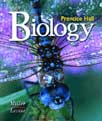 http://www.phschool.com/atschool/biology/
http://www.phschool.com/atschool/biology/
test password
Sources:
 http://www.angelfire.com/ga/sweetgeorgiapeach1/grandmom.html
http://www.angelfire.com/ga/sweetgeorgiapeach1/grandmom.html
 http://www.gifanimations.com
http://www.gifanimations.com
http://www.smithlifescience.com/PH001LessonPlans.htm














 http://www.webdeveloper.com/animations/bnifiles/book.gif
http://www.webdeveloper.com/animations/bnifiles/book.gif
http://www.extension.iastate.edu/gif/

























